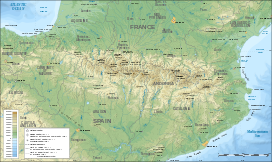The Pic de la Munia culminating at 3,133 m (10,279 ft) is the highest point of the three cirques of Troumouse, Barroude and Barrosa. It is located on the border between France (Hautes-Pyrénées department) and Spain (Huesca province).
| Pic de la Munia | |
|---|---|
 Le cirque de Barrosa : à gauche, la Robiñera, à droite la Munia. | |
| Highest point | |
| Elevation | 3,133 m (10,279 ft)[1] |
| Coordinates | 42°42′46″N 0°07′58″E / 42.71278°N 0.13278°E[2] |
| Geography | |
| Région Communauté | Midi-Pyrénées Aragon |
| Département Province | Hautes-Pyrénées Huesca |
| Parent range | Massif de la Munia Pyrénées |
| Climbing | |
| First ascent | Victor Paget and Charles Packe (1864) |
Toponymy
editEra Munia could mean "nun", from « moniale », of Spanish origin.[3] Otherwise, it could stem from Latin, moenia meaning « walls », which corresponds to its relief[citation needed].
Access
editThere are three main access routes which lead to the summit of la Munia.
The first, most direct and most frequented, runs along the impressive north face, in the vast cirque de Troumouse. The starting point is located at the Troumouse car park, at about 2,100 m. The ascent is a bit technical (PD), with two delicate passages : a first small wall (III-) that one needs to climb before arriving at the col de la Munia, then the cat's footstep (II) shortly before the summit ~ all this achieved in a spectacular high mountain landscape. After having reached the col de la Munia (at 2,853 m), the route leading to the summit is clear-cut, leading straight east, by a sharp ridge.
The second starts south, in the Pineta valley at about 1,900 m. A path leads (without any major difficulty) to the col de la Munia, this time from the other side of the mountain. The ascent concludes the same way as the first route.
The third, begins at Troumouse car park, but runs through the most eastern point of the cirque. The ascent is made along the crest, from east to west.
See also
editReferences
edit- ^ Source : Géoportail
- ^ Coordonnées identifiées à l'aide de Géoportail et WikiMapia
- ^ Marcellin Bérot, La vie des hommes de la montagne dans les Pyrénées racontée par la toponymie, avec le concours du Centre régional des lettres de Midi-Pyrénées, 1998, Milan et parc national des Pyrénées
